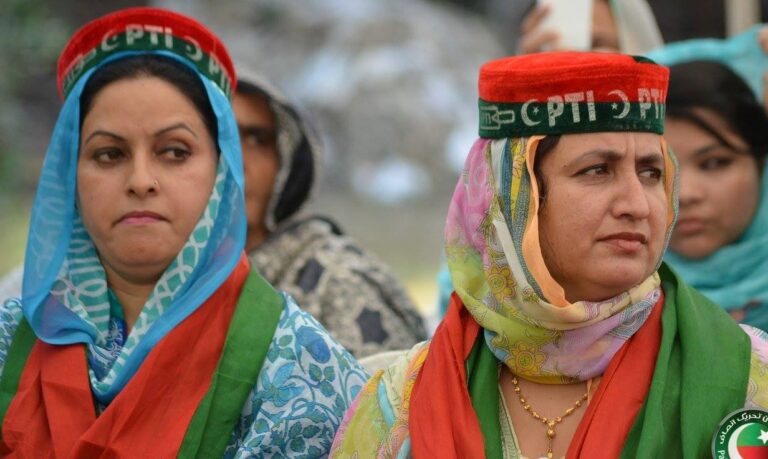By: Asad Zia
PESHAWAR: The Pakistan Tehreek-e-Insaf (PTI) government’s recent announcement of reserved seats for women in the Khyber Pakhtunkhwa Assembly has sparked widespread outrage among senior women workers from Peshawar, who feel consistently ignored and marginalized.
According to a senior PTI worker from Peshawar, who wished to remain anonymous blamed that despite PTI’s two consecutive terms in the province, not a single woman from Peshawar has been allocated a reserved seat, raising concerns about the party’s commitment to empowering women from the district.
She shared her frustration, stating that during PTI’s last five years in government, not a single woman with a domicile from Peshawar district was in the assembly.
She further complained that in the previous term, many women used Peshawar’s name to secure reserved seats, but in reality, they were from other districts and did not address or allocate funds for the development of women in Peshawar.
The worker mentioned that Rabia Basri, for instance, used Peshawar’s name but actually belonged to Dera Ismail Khan. Similarly, Asia Khattak claimed affiliation with Peshawar but was from Karak district. Aisha Naeem resided in Peshawar but hailed from Swabi, while Nagina Khan was from Thana Swat, Meher Taj Roghani from Mardan, and others like Nagis Ali, Naseem Hayat, Dina Naz, Bibi Fozia, Maliha Tanveer, Nadia Sher, and Zarin Zia were not originally from Peshawar.
“This raises questions about the party’s commitment to empowering women from the district and ensuring their voices are heard in the legislative process,” she said.
The issue highlights the need for greater transparency and accountability in the nomination process, ensuring that candidates genuinely represent the districts they claim to be from.
According to data from the Free and Fair Election Network (FAFEN), women constitute almost half of Khyber Pakhtunkhwa’s population, but they hold only 17% of the Provincial Assembly’s total membership. Their representation is also alarmingly low in the Cabinet and Assembly Committees.
“This is a clear indication of the party’s lack of interest in empowering women from Peshawar,” said Kalsoom Johar, a Peshawar-based political activist. “We have been consistently ignored, and our issues remain unaddressed.”
Also Read: KP Taking Lead in Women’s Participation in General Elections
The Constitution of Pakistan reserves 17% of legislative seats for women. In Khyber Pakhtunkhwa, there are 22 reserved seats for women in the Provincial Assembly. For this tenure, PTI has finalized names for the reserved seats in both the National and Khyber Pakhtunkhwa Assemblies.
As per details, the list for reserved seats has been submitted to the Election Commission of Pakistan after approval by KP Chief Minister Ali Amin Gandapur. The list includes Mishal Yousafzai, Fauzia Bibi, Ayesha Naseem, Uzma Riaz, Sajida Hanif, and others. However, Peshawar district has once again been overlooked, with most candidates hailing from other districts.
“This is a slap in the face for women from Peshawar,” said another senior PTI member from Peshawar, who wished to remain anonymous. “We have been consistently marginalized, and our voices silenced.”
The neglect of Peshawar’s women has serious consequences. The allocated budget for women in Peshawar is often diverted to other districts, and no one raises a voice for their rights.
“Peshawar’s rural areas face numerous challenges, including lack of education, healthcare, and economic opportunities,” said Kalsoom Johar. “But our voices are silenced, and our issues remain unaddressed.”
The PTI’s nomination process has been criticized for being opaque and driven by party politics. A senior PTI member admitted that party recommendations from top members often override the genuine needs of districts like Peshawar.
“PTI’s vision is to empower old workers, but unfortunately, this vision is not always implemented truthfully,” he conceded.
PTI women workers from Peshawar are now demanding transparency, accountability, and empowerment. They urge that the nomination process ensures genuine representation of women from underrepresented districts like Peshawar, addressing their specific needs and issues.
“We will not be silenced,” said Kalsoom Johar. “We will fight for our rights and ensure that our voices are heard.”
Rabia Tabasum, another PTI worker from Peshawar, emphasized that PTI should establish a merit-based nomination process that considers district-specific needs.
She demanded that the party prioritize empowering women from underrepresented districts like Peshawar and ensure increased representation of women in the Khyber Pakhtunkhwa Assembly, Cabinet, and Committee Chairpersons.


